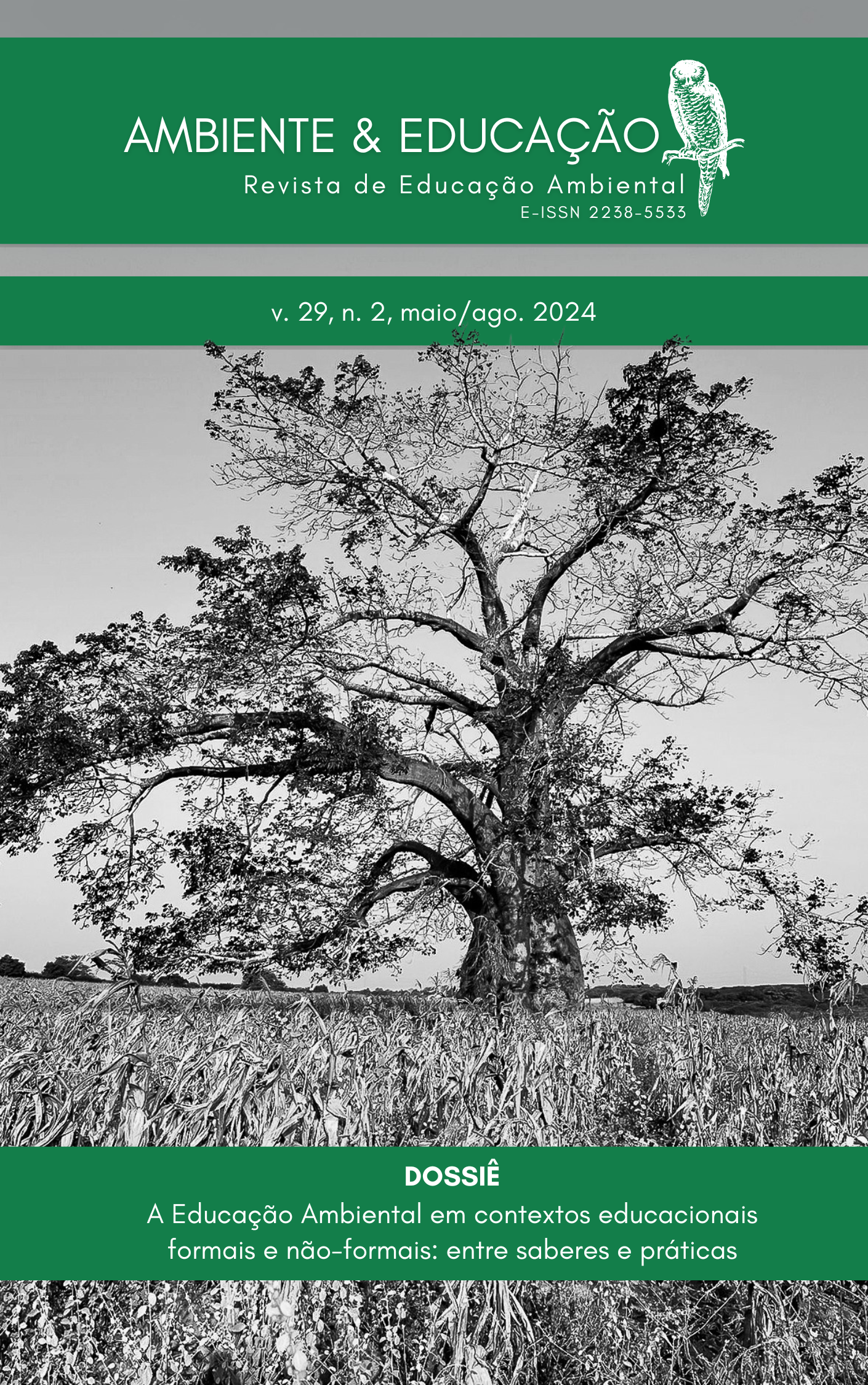Influence of Future Concerns on Personal Change and Personal and Institutional Engagement in the Context of Climate Change
DOI:
https://doi.org/10.63595/ambeduc.v29i2.16441Palavras-chave:
Environmental Education, Climate Change, Personal Change, Institutional Engagement, Concern for the FutureResumo
Influência das Preocupações com o Futuro na Mudança Pessoal e no Engajamento Pessoal e Institucional no Contexto das Mudanças Climáticas
This study investigates the relationship between concern for the future (FC), personal change (PC), personal engagement (PE), and institutional engagement (IE) in the context of climate change. A survey of 388 university students from the state of Santa Catarina, in the south of Brazil, was analyzed using Partial Least Squares Structural Equation Modeling (PLS-SEM). The study reveals positive relationships between FC and PC, as well as between FC and PE, suggesting that FC can promote PC and increase PE in climate actions. However, a negative relationship between FC and IE indicates that an increase in FC may be associated with a reduced perception of governmental efforts in mitigating climate change. Furthermore, a positive association between PE and IE suggests that engaged individuals tend to recognize a greater institutional effort. This research contributes to the understanding of how individual concerns about climate change influence both personal actions and perceptions of institutional responses.
Downloads
Referências
AKERLOF, Karen et al. Do people “personally experience” global warming, and if so how, and does it matter? Global environmental change, v. 23, n. 1, p. 81-91, 2013. https://doi.org/10.1016/j.gloenvcha.2012.07.006 DOI: https://doi.org/10.1016/j.gloenvcha.2012.07.006
BALLEW, Matthew T. et al. Climate change in the American mind: Data, tools, and trends. Environment: Science and Policy for Sustainable Development, v. 61, n. 3, p. 4-18, 2019. https://doi.org/10.1080/00139157.2019.1589300 DOI: https://doi.org/10.1080/00139157.2019.1589300
BALLEW, Matthew T. et al. Does socioeconomic status moderate the political divide on climate change? The roles of education, income, and individualism. Global Environmental Change, v. 60, p. 102024, 2020. https://doi.org/10.1016/j.gloenvcha.2019.102024 DOI: https://doi.org/10.1016/j.gloenvcha.2019.102024
BARANZINI, Andrea; CARATTINI, Stefano. Effectiveness, earmarking and labeling: testing the acceptability of carbon taxes with survey data. Environmental Economics and Policy Studies, v. 19, p. 197-227, 2017. https://doi.org/10.1007/s10018-016-0144-7 DOI: https://doi.org/10.1007/s10018-016-0144-7
BERGQUIST, Magnus et al. Meta-analyses of fifteen determinants of public opinion about climate change taxes and laws. Nature Climate Change, v. 12, n. 3, p. 235-240, 2022. https://doi.org/10.1038/s41558-022-01297-6 DOI: https://doi.org/10.1038/s41558-022-01297-6
BOSTROM, Ann et al. Causal thinking and support for climate change policies: International survey findings. Global Environmental Change, v. 22, n. 1, p. 210-222, 2012. https://doi.org/10.1016/j.gloenvcha.2011.09.012 DOI: https://doi.org/10.1016/j.gloenvcha.2011.09.012
BRÜGGER, Adrian et al. Psychological responses to the proximity of climate change. Nature climate change, v. 5, n. 12, p. 1031-1037, 2015. https://doi.org/10.1038/nclimate2760 DOI: https://doi.org/10.1038/nclimate2760
CANTON, Helen. World Meteorological Organization—WMO. In: The Europa Directory of International Organizations 2021. Routledge, 2021. p. 388-393. https://doi.org/10.4324/9781003179900 DOI: https://doi.org/10.4324/9781003179900-59
CHANCEL, Lucas; BOTHE, Philipp and VOITURIEZ, Tancrède. Climate Inequality Report 2023. Fair taxes for a sustainable future in the Global South., 2023. Available at: https://wid.world/wp-content/uploads/2023/01/cbv2023-climateinequalityreport-2.pdf
CORNER, Adam; MARKOWITZ, Ezra; PIDGEON, Nick. Public engagement with climate change: the role of human values. Wiley Interdisciplinary Reviews: Climate Change, v. 5, n. 3, p. 411-422, 2014. https://doi.org/10.1002/wcc.269 DOI: https://doi.org/10.1002/wcc.269
CZARNEK, Gabriela; KOSSOWSKA, Małgorzata; SZWED, Paulina. Right-wing ideology reduces the effects of education on climate change beliefs in more developed countries. Nature Climate Change, v. 11, n. 1, p. 9-13, 2021. https://doi.org/10.1038/s41558-020-00930-6 DOI: https://doi.org/10.1038/s41558-020-00930-6
DECHEZLEPRÊTRE, Antoine et al. Fighting climate change: International attitudes toward climate policies. National Bureau of Economic Research, 2022. https://doi.org/10.3386/w30265 DOI: https://doi.org/10.3386/w30265
DOUENNE, Thomas; FABRE, Adrien. French attitudes on climate change, carbon taxation and other climate policies. Ecological Economics, v. 169, p. 106496, 2020. https://doi.org/10.1016/j.ecolecon.2019.106496 DOI: https://doi.org/10.1016/j.ecolecon.2019.106496
DREWS, S.; van den BERGH, J.C. What explains public support for climate policies? A review of empirical and experimental studies. Climate Policy, v. 16, n. 7, p. 855-876, 2016. https://doi.org/10.1080/14693062.2015.1058240 DOI: https://doi.org/10.1080/14693062.2015.1058240
FAIRBROTHER, Malcolm. Public opinion about climate policies: A review and call for more studies of what people want. PLoS Climate, v. 1, n. 5, p. e0000030, 2022. https://doi.org/10.1371/journal.pclm.0000030 DOI: https://doi.org/10.1371/journal.pclm.0000030
FAIRBROTHER, Malcolm; SEVÄ, Ingemar Johansson; KULIN, Joakim. Political trust and the relationship between climate change beliefs and support for fossil fuel taxes: Evidence from a survey of 23 European countries. Global Environmental Change, v. 59, p. 102003, 2019. https://doi.org/10.1016/j.gloenvcha.2019.102003 DOI: https://doi.org/10.1016/j.gloenvcha.2019.102003
FORNELL, Claes; LARCKER, David F. Structural Equation Models with Unobservable Variables and Measurement Error: Algebra and Statistics. Journal of Marketing Research, v. 18, n. 3, p. 382-388, 1981. https://doi.org/10.2307/3150980 DOI: https://doi.org/10.1177/002224378101800313
GEELS, Frank W. The impact of the financial–economic crisis on sustainability transitions: Financial investment, governance and public discourse. Environmental Innovation and Societal Transitions, v. 6, p. 67-95, 2013. https://doi.org/10.1016/j.eist.2012.11.004 DOI: https://doi.org/10.1016/j.eist.2012.11.004
GONZÁLEZ-HERNÁNDEZ, D. Liliana; AGUIRRE-GAMBOA, Raúl A.; MEIJLES, Erik W. The role of climate change perceptions and sociodemographics on reported mitigation efforts and performance among households in northeastern Mexico. Environment, Development and Sustainability, p. 1-23, 2022. https://doi.org/10.1007/s10668-021-02093-6 DOI: https://doi.org/10.1007/s10668-021-02093-6
HAIR JR, Joseph F. et al. Partial least squares structural equation modeling (PLS-SEM) using R: A workbook. Springer Nature, 2021. https://doi.org/10.1007/978-3-030-80519-7 DOI: https://doi.org/10.1007/978-3-030-80519-7
HAIR JR, Joseph F. et al. PLS-SEM or CB-SEM: updated guidelines on which method to use. International Journal of Multivariate Data Analysis, v. 1, n. 2, p. 107-123, 2017. https://doi.org/10.1504/ijmda.2017.087624 DOI: https://doi.org/10.1504/IJMDA.2017.087624
HAIR, Jr. Joseph. F. Multivariate data analysis: An overview. International Encyclopedia of Statistical Science, p. 904-907, 2011. DOI: https://doi.org/10.1007/978-3-642-04898-2_395
HAMMERLE, Mara; BEST, Rohan; CROSBY, Paul. Public acceptance of carbon taxes in Australia. Energy Economics, v. 101, p. 105420, 2021. https://doi.org/10.1016/j.eneco.2021.105420 DOI: https://doi.org/10.1016/j.eneco.2021.105420
HAN, Heejin; AHN, Sang Wuk. Youth mobilization to stop global climate change: Narratives and impact. Sustainability, v. 12, n. 10, p. 4127, 2020. https://doi.org/10.3390/su12104127 DOI: https://doi.org/10.3390/su12104127
HARRING, Niklas; JAGERS, Sverker C.; MATTI, Simon. The significance of political culture, economic context and instrument type for climate policy support: a cross-national study. Climate Policy, v. 19, n. 5, p. 636-650, 2019. https://doi.org/10.1080/14693062.2018.1547181 DOI: https://doi.org/10.1080/14693062.2018.1547181
HENSELER, Jörg; RINGLE, Christian M.; SARSTEDT, Marko. A new criterion for assessing discriminant validity in variance-based structural equation modeling. Journal of the academy of marketing science, v. 43, p. 115-135, 2015. https://doi.org/10.1007/s11747-014-0403-8 DOI: https://doi.org/10.1007/s11747-014-0403-8
KONISKY, David M.; HUGHES, Llewelyn; KAYLOR, Charles H. Extreme weather events and climate change concern. Climatic change, v. 134, p. 533-547, 2016. https://doi.org/10.1007/s10584-015-1555-3 DOI: https://doi.org/10.1007/s10584-015-1555-3
LEE, Katharine et al. Youth perceptions of climate change: A narrative synthesis. Wiley Interdisciplinary Reviews: Climate Change, v. 11, n. 3, p. e641, 2020. https://doi.org/10.1002/wcc.641 DOI: https://doi.org/10.1002/wcc.641
LI, Yuh-Yuh; LIU, Shu-Chiu. Examining Taiwanese students’ views on climate change and the teaching of climate change in the context of higher education. Research in Science & Technological Education, v. 40, n. 4, p. 515-528, 2022. https://doi.org/10.1080/02635143.2020.1830268 DOI: https://doi.org/10.1080/02635143.2020.1830268
LOY, Laura S.; SPENCE, Alexa. Reducing, and bridging, the psychological distance of climate change. Journal of Environmental Psychology, v. 67, p. 101388, 2020. https://doi.org/10.1016/j.jenvp.2020.101388 DOI: https://doi.org/10.1016/j.jenvp.2020.101388
LUJALA, Päivi; LEIN, Haakon; RØD, Jan Ketil. Climate change, natural hazards, and risk perception: the role of proximity and personal experience. Local Environment, v. 20, n. 4, p. 489-509, 2015. https://doi.org/10.1080/13549839.2014.887666 DOI: https://doi.org/10.1080/13549839.2014.887666
MARTINHO, Graça; BALAIA, Natacha; PIRES, Ana. The Portuguese plastic carrier bag tax: The effects on consumers’ behavior. Waste management, v. 61, p. 3-12, 2017. https://doi.org/10.1016/j.wasman.2017.01.023 DOI: https://doi.org/10.1016/j.wasman.2017.01.023
MILDENBERGER, Matto et al. Limited impacts of carbon tax rebate programmes on public support for carbon pricing. Nature Climate Change, v. 12, n. 2, p. 141-147, 2022. https://doi.org/10.1038/s41558-021-01268-3 DOI: https://doi.org/10.1038/s41558-021-01268-3
MYERS, Teresa A. et al. The relationship between personal experience and belief in the reality of global warming. Nature climate change, v. 3, n. 4, p. 343-347, 2013. https://doi.org/10.1038/nclimate1754 DOI: https://doi.org/10.1038/nclimate1754
OJALA, Maria. Hope and climate change: The importance of hope for environmental engagement among young people. Environmental education research, v. 18, n. 5, p. 625-642, 2012. https://doi.org/10.1080/13504622.2011.637157 DOI: https://doi.org/10.1080/13504622.2011.637157
PODSAKOFF, Philip M. et al. Common method biases in behavioral research: a critical review of the literature and recommended remedies. Journal of applied psychology, v. 88, n. 5, p. 879, 2003. https://doi.org/10.1037/0021-9010.88.5.879 DOI: https://doi.org/10.1037/0021-9010.88.5.879
POORTINGA, Wouter et al. Uncertain climate: An investigation into public scepticism about anthropogenic climate change. Global environmental change, v. 21, n. 3, p. 1015-1024, 2011. https://doi.org/10.1016/j.gloenvcha.2011.03.001 DOI: https://doi.org/10.1016/j.gloenvcha.2011.03.001
RESER, Joseph P.; BRADLEY, Graham L. The nature, significance, and influence of perceived personal experience of climate change. Wiley Interdisciplinary Reviews: Climate Change, v. 11, n. 5, p. e668, 2020. https://doi.org/10.1002/wcc.668 DOI: https://doi.org/10.1002/wcc.668
SHI, Jing et al. Knowledge as a driver of public perceptions about climate change reassessed. Nature Climate Change, v. 6, n. 8, p. 759-762, 2016. https://doi.org/10.1038/nclimate2997 DOI: https://doi.org/10.1038/nclimate2997
SHI, Jing; VISSCHERS, Vivianne HM; SIEGRIST, Michael. Public perception of climate change: The importance of knowledge and cultural worldviews. Risk Analysis, v. 35, n. 12, p. 2183-2201, 2015. https://doi.org/10.1111/risa.12406 DOI: https://doi.org/10.1111/risa.12406
SHUKLA, Priyadarshi R. et al. IPCC, 2019: Climate Change and Land: an IPCC special report on climate change, desertification, land degradation, sustainable land management, food security, and greenhouse gas fluxes in terrestrial ecosystems, 2019. www.ipcc.ch
SONNENSCHEIN, Jonas; SMEDBY, Nora. Designing air ticket taxes for climate change mitigation: insights from a Swedish valuation study. Climate Policy, v. 19, n. 5, p. 651-663, 2019. https://doi.org/10.1080/14693062.2018.1547678 DOI: https://doi.org/10.1080/14693062.2018.1547678
SPENCE, Alexa et al. Perceptions of climate change and willingness to save energy related to flood experience. Nature climate change, v. 1, n. 1, p. 46-49, 2011. https://doi.org/10.1038/nclimate1059 DOI: https://doi.org/10.1038/nclimate1059
SWIM, Janet K.; GEIGER, Nathaniel. Policy attributes, perceived impacts, and climate change policy preferences. Journal of Environmental Psychology, v. 77, p. 101673, 2021. https://doi.org/10.1016/j.jenvp.2021.101673 DOI: https://doi.org/10.1016/j.jenvp.2021.101673
TJERNSTRÖM, Emilia; TIETENBERG, Thomas. Do differences in attitudes explain differences in national climate change policies? Ecological economics, v. 65, n. 2, p. 315-324, 2008. https://doi.org/10.1016/j.ecolecon.2007.06.019 DOI: https://doi.org/10.1016/j.ecolecon.2007.06.019
UYDURANOGLU, Ayse; OZTURK, Serda Selin. Public support for carbon taxation in Turkey: drivers and barriers. Climate Policy, v. 20, n. 9, p. 1175-1191, 2020. https://doi.org/10.1080/14693062.2020.1816887 DOI: https://doi.org/10.1080/14693062.2020.1816887
VUICHARD, Pascal; STAUCH, Alexander; DÄLLENBACH, Nathalie. Individual or collective? Community investment, local taxes, and the social acceptance of wind energy in Switzerland. Energy Research & Social Science, v. 58, p. 101275, 2019. https://doi.org/10.1016/j.erss.2019.101275 DOI: https://doi.org/10.1016/j.erss.2019.101275
WALLACH, Omri. Race to net zero: Carbon neutral goals by country. Visual Capitalist, 2021. Available online at https://www.visualcapitalist.com/sp/race-to-net-zero-carbon-neutral-goals-by-country (accessed December 8, 2023).
WICKI, Michael; FESENFELD, Lukas; BERNAUER, Thomas. In search of politically feasible policy-packages for sustainable passenger transport: Insights from choice experiments in China, Germany, and the USA. Environmental Research Letters, v. 14, n. 8, p. 084048, 2019. https://doi.org/10.1088/17489326/ab30a2 DOI: https://doi.org/10.1088/1748-9326/ab30a2
WISEMAN, John; WILLIAMSON, Lara; FRITZE, Jess. Community engagement and climate change: learning from recent Australian experience. International Journal of Climate Change Strategies and Management, v. 2, n. 2, p. 134-147, 2010. https://doi.org//10.1108/17568691011040399 DOI: https://doi.org/10.1108/17568691011040399
ZAVAL, Lisa et al. How warm days increase belief in global warming. Nature Climate Change, v. 4, n. 2, p. 143-147, 2014. https://doi.org/10.1038/nclimate2093 DOI: https://doi.org/10.1038/nclimate2093
ZHANG, Yaming; ABBAS, Majed; IQBAL, Wasim. Analyzing sentiments and attitudes toward carbon taxation in Europe, USA, South Africa, Canada and Australia. Sustainable Production and Consumption, v. 28, p. 241-253, 2021. https://doi.org/10.1016/j.spc.2021.04.010 DOI: https://doi.org/10.1016/j.spc.2021.04.010
Downloads
Publicado
Como Citar
Edição
Seção
Licença
Copyright (c) 2025 Fernando Alves Silveira , Jaime Dagostim Picolo, Jonas Rickrot Rosner

Este trabalho está licenciado sob uma licença Creative Commons Attribution-NonCommercial-NoDerivatives 4.0 International License.
Os (as) autores(as) que publicam nesta revista concordam com os seguintes termos: Os (as) autores(as) mantém os direitos autorais e concedem à revista o direito de primeira publicação, com o trabalho simultaneamente licenciado sob a Licença Creative Commons Atribuição-NãoComercial-SemDerivações (CC BY-NC-ND 4.0) que permite o compartilhamento do trabalho com reconhecimento da autoria e publicação inicial nesta revista. Os (as) autores(as) têm autorização para assumir contratos adicionais separadamente, para distribuição não-exclusiva da versão do trabalho publicada nesta revista (ex.: publicar em repositório institucional ou como capítulo de livro), com reconhecimento de autoria e publicação inicial nesta revista. Os (as) autores(as) têm permissão e são estimulados a publicar e distribuir seu trabalho online (ex.: em repositórios institucionais ou na sua página pessoal) em qualquer ponto antes ou durante o processo editorial, já que isso pode aumentar o impacto e a citação do trabalho publicado.












